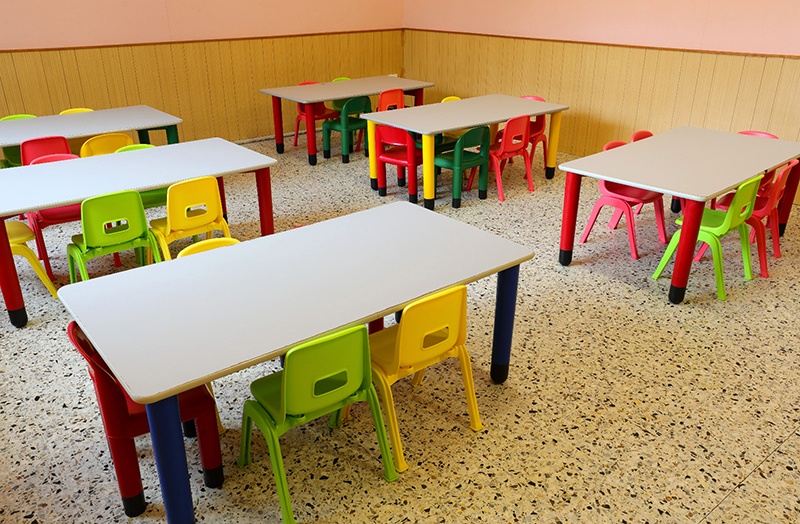KUWAIT: When the Cabinet announced last week that schools will reopen in September, there was no mention of nurseries. After being closed for over a year, many nurseries in Kuwait went bankrupt and had to close, while others have fallen in debt waiting to reopen.
There used to be around 500 nurseries in all of Kuwait’s governorates. According to a study by the Preschool Owners Forum (POF), 200 nurseries closed down in the previous year due to the volatile work environment, while 100 nurseries shut down due to the pandemic. The remaining 200 nurseries have been closed since last year and are struggling due to accumulating debts, and many may not survive if the closure lasts any longer.
The number of children aged between 0 to 4 years is 309,138, both Kuwaiti and of other nationalities. Around 1,500 Kuwaiti employees work in nurseries, which have 300 owners. If these businesses close, entrepreneurs and employees will have to be transferred to work in the public sector, which will cost the government over KD 13 million annually. Nurseries pay around KD 1,700,000 annually to the government in fees for licenses, work permits, residencies and others. They also pay around KD 2 million for social security.
The debts and financial losses of some nursery owners has reached hundreds of thousands of dinars. Hanan Al-Mudhahka owns two nurseries for disabled children, and estimates her losses have exceeded KD 300,000 already. “I employed a total of 70 employees in both my nurseries. I paid full salaries to my staff for a couple of months after the closure, as well as the rent, till I ran out of resources and was no longer able to do so. Other nursery owners and I were not compensated by the government, and even banks refuse to give us loans,” she told Kuwait Times.
Employees of nurseries are suffering too. “As I had no resources to pay salaries and rent, I was not able to renew the license of the nursery. As a result, I can’t renew the residency of the employees, and they are stuck without a job and without residency. They can’t work in other places as they don’t have residency, and they cannot leave the country as they haven’t received their indemnities,” explained Mudhahka.
She blames this mess on the illogical decisions of the government. “The government allowed schools to reopen for the new academic year. But they didn’t think of the teachers and other employees who are supposed to start working from May. Where will they leave their kids? Why are nurseries not treated in the same way as schools? Also, the health ministry allowed nurseries for disabled children to reopen, but the ministry of social affairs didn’t allow this to happen, which is very weird,” she added.
Maryam Fakhrou is another owner of a nursery, whose losses have reached over KD 90,000. “I had 14 employees at my nursery, which opened in January 2017. This closure due to the pandemic hit our business strongly, and I couldn’t continue paying salaries. Many of my staff left the nursery, although I paid for their training courses and they got certificates, as well as their residency fees,” she noted.
Fakhrou hasn’t received any compensation. “The government didn’t compensate me for the closure, so I filed a case at the court. Also, the landlord didn’t relieve me from paying the rent or at least give a discount.
He rather filed a case demanding payment of the rent for all the months that I stopped paying him,” she said.
“I still have hope that I will reopen the nursery and make my business successful to reach my goal of educating kids and taking care of them to improve the entire community. I call upon the officials in charge to allow nurseries to reopen to place children in a suitable environment, which is their right,” Fakhrou stressed.
The closure of the nurseries has had a negative psychological effect on children, and even their parents. According to Psychological Educational Counselor Ghadeer Safar, this long closure has destroyed some families. “I encountered a case of divorce caused by the constant presence of young children at home. As the young child was at home all the time for months, he was bored and cried frequently, which affected the parents, who were always fighting and finally got divorced,” she told Kuwait Times.
“The long stay at home has caused psychological problems for some children. We have noticed more cases of mental disorders and domestic violence. We have also registered an increased number of drownings among children due to a lack of activity. Linguistic delays, poor social communication skills and gaining weight are other problems that kids face due to their continuous stay at home, especially if they are living in a small apartment,” Safar said.
“Not going to school or nursery caused the routines of most children to change. They stay awake till late at night and sleep till late in the morning, which affects their brains, which grows during the night. This causes physical and psychological health disorders. Also, many kids have become aggressive. Children are also missing out on skills they learn at the nursery, such as different languages. They miss interacting with other kids of their age, all of which affects their mental development,” noted Safar.
.jpg)



